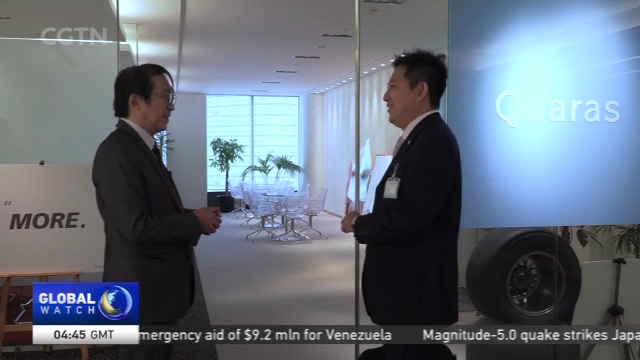
13:29, 27-Nov-2018
China-Japan Business Relations: Bilateral investments continue to rise
Updated
12:50, 30-Nov-2018
02:56

It's time for our special series on 40 years of China's reform and opening up. The trading partnership between China and Japan has been historically important. Many believe the trade and capital exchanges between the two countries are complementary to the two economies. CGTN's Terrence Terashima reports.
In the last decade, China became Japan's largest and most important trade partner. Japanese investments to China continue to rise, while inbound Chinese investments also are seeing a rapid increase. Chinese trademark application in Japan have increased five times over in the last three years.
TERRENCE TARASHIMA TOKYO "China and Japan share many cultural similarities, but when it comes to business culture, they're considerably different. And these differences have led to misunderstandings in business transactions."
Chong Wang, who runs a marketing consulting firm in Tokyo, says bridging that cultural gap in business between the two neighbors can be difficult.
CHONG WANG CEO, JUCS K.K. "Chinese businessmen can be very direct and demand a quick response, while Japanese firms would not say 'NO' but rather take the proposal back for thorough consideration. Which sometimes causes misunderstanding."
One major difference is the approach towards a business partnership.
CHONG WANG CEO, JUCS K.K. "Japanese companies like to take time and effort in establishing trust in business relationships, but once you get that trust, they'll maintain a long-lasting relationship. However, many Chinese firms would put more emphasis on profit in business partnerships."
YUKIO MATSUSHITA, EXEC. GENERAL MANAGER QUARAS INC. "Chinese businessmen have a very logical approach. Not caught up by the past, customs, or making compromises in what they want. Very thorough in trying to achieve the goal. It is a different culture, a different business style."
Quaras Inc., one of Japan's leading media conglomerates, provides communication services to in-bound Chinese businesses.
YUKIO MATSUSHITA, EXEC. GENERAL MANAGER QUARAS INC. "They have very different demands. It is not compatible with the Japanese business style. But at the same time, we need to realize that it is possible to complete business without being fixated on old industry rules. We also need to adapt."
Chong Wang, says he has seen many Chinese firms fail to take root.
CHONG WANG CEO, JUCS K.K. "I think it is the same with any firms seeking to invest in foreign countries. One will not succeed in bringing the Chinese style business into a country. It is important to understand the local culture, because it is very different. What I advise my clients to do are 'Localizations' of business."
Analysts say there will be a further rise in Chinese investments into Japan. And bridging these differences in business styles will be essential. Terrence Terashima, CGTN, Tokyo.

SITEMAP
Copyright © 2018 CGTN. Beijing ICP prepared NO.16065310-3
Copyright © 2018 CGTN. Beijing ICP prepared NO.16065310-3